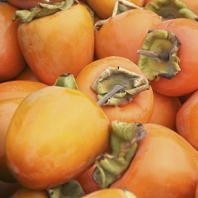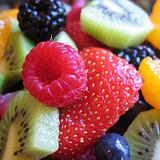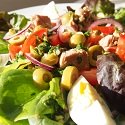Persimmon Nutrition Facts,
Health Benefits of Persimmons
All about persimmon nutrition information, nutritional benefits of persimmon, calories in persimmons, persimmon nutrients
Persimmon fruit comes in many varieties, a number of which are astringent, that is they will leave your mouth feeling dry due to their tannin content. The riper the fruit, the less astringent it will be. A good example of this is a banana. Ever eaten an unripe banana? However, a number of varieties are non-astringent, and these can be eaten before they are fully ripe, much like a crisp apple. But, how will you know before buying – well hopefully your supermarket will have it labelled. In the United Kingdom, the Persimmon is known as Sharon Fruit. It looks almost like a large orange tomato.
The persimmon is high in calories for a fruit, 127 calories per serving (100g or 3.5oz). It is high in glucose which gives it a high carbohydrate content. In fact, one third of this fruit is made up of carbohydrates.
It is packed with vitamin C, one serving provides all that you will need for one day, exceeding the recommended daily intake (RDI). It also provides a good level of iron and potassium. Note that the Japanese variety has a different set of nutrients and is not as high in vitamin C, but is loaded with Vitamin A. Persimmon’s are believed to be good for regulating our blood pressure and helping to protects us from heart disease.
To eat this fruit, simply cut in half and spoon out its contents. If you like, freeze the two halves for a few hours then eat it out of the skin. When buying, check the astringent variety is soft. The non-astringent fruit can be purchased firm.
Compare persimmon nutrition facts to the other fruits.
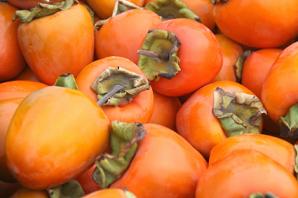
Nutritional Value of Persimmons
| Persimmon nutritional value per 100 g (3.5 oz) | |||
|---|---|---|---|
| Proximates: | |||
| Nutrient | Persimmons, native, raw. Refuse: 18% (2% calyx, 16% seeds). Scientific Name: Diospyros virginiana | Persimmons, japanese, raw. Scientific Name: Diospyros kaki | Persimmons, japanese, dried |
| Water | 64.40 g | 80.32 g | 23.01 g |
| Energy | 531 kJ (127 kcal) | 293 kJ (70 kcal) | 1146 kJ (274 (kcal) |
| Protein | 0.80 g | 0.58 g | 1.38 g |
| Carbohydrates | 33.50 g | 18.59 g | 73.43 g |
| Total Fat: | 0.40 g | 0.19 g | 0.59 g |
| Fiber | - | 3.6 g | 14.5 g |
| Cholesterol | 0 mg | 0 mg | 0 mg |
| Minerals: | |||
| Calcium, Ca | 27 mg (3%) | 8 mg (1%) | 25 mg (3%) |
| Iron, Fe | 2.50 mg (14%) | 0.15 mg (0.8%) | 0.74 mg (4%) |
| Magnesium, Mg | - | 9 mg (2%) | 31 mg (8%) |
| Phosphorus, P | 26 mg (3%) | 17 mg (2%) | 81 mg (8%) |
| Potassium, K | 310 mg (7%) | 161 mg (3%) | 802 mg (23%) |
| Sodium, Na | 1 mg (0.04%) | 1 mg (0.04%) | 2 mg (0%) |
| Zinc, Zn | - | 0.11 mg (0.7%) | 0.42 mg (3%) |
| Copper, Cu | - | 0.113 mg (6%) | 0.442 mg (21%) |
| Manganese, Mn | - | 0.355 mg (18%) | 1.390 mg (70%) |
| Selenium, Se | - | 0.6 mcg (0.9%) | - |
| Vitamins: | |||
| Vitamin C | 66.0 mg (110%) | 7.2 mg (12%) | 0 mg |
| Thiamine (Vit. B1) | - | 0.030 mg (2%) | - |
| Riboflavin (Vit. B2) | - | 0.020 mg (1%) | 0.029 mg (2%) |
| Niacin (Vit. B3) | - | 0.100 mg (0.5%) | 0.180 mg (1%) |
| Vitamin B6 | - | 0.100 mg (5%) | - |
| Folate (Vit. B9) | - | 8 mcg (2%) | - |
| Vitamin A | - | 1627 IU (33%) | 767 IU (15%) |
| Vitamin E | - | 0.73 mg (4%) | - |
| Vitamin K | - | 2.6 mcg (3%) | - |
| Percentages are relative to US Recommended Daily Intake (RDI) for adults. | |||
Author: Lana Soko
You Might Also Like:
Like This Page?
|
Share This Page:
|
Search Our Site:

Free E-Book:
We Recommend:
Looking to get your body into great shape? Get the very best results for your efforts and money! Save your valuable time from surfing the internet. These are theBestselling Weight Loss Programs
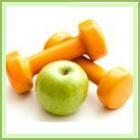
Programs that work and have thousands of satisfied customers worldwide!

 |
